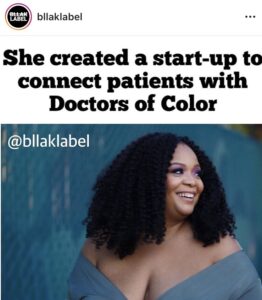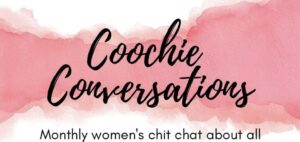It's really hard to find equitable health care for black women with fibroids. In fact, 73 percent of Black women say their doctors never mention UFE, a minimally invasive fibroid treatment option. Even worse? Here's a sad fact for July's upcoming fibroid awareness month: one in five Black women believes her only fibroid treatment option is a hysterectomy. That's a big problem, since this major surgery causes many adverse health effects, and is often not necessary to relieve fibroid symptoms.
These statistics reveal the treatment knowledge disparity that hurts women of color who have fibroids. And that's something Kimberly Wilson, our Woman Crush Wednesday nominee, learned the hard way. But, after her healthcare struggle, she's making it easier to find equal care for black women. And, together with efforts from other groups, Wilson is leveling the playing healthcare playing field. Which is why we're sharing her story today, and naming her our #WCW, woman crush of the week.

In 2017, Wilson was diagnosed with fibroids. But, even though she had many fibroid symptoms, getting that diagnosis was really hard. She told Essence magazine, "Over a period of six months, I visited four different providers—all of whom were White men. Two completely dismissed my pain and trauma, while the other two stated that a hysterectomy was my only option. It wasn’t until finding a Black physician—over 100 miles away, that I received the culturally competent care that I needed and deserved.”
After her experience, Wilson wanted to make it easier for women of color to access quality healthcare. And part of that, she realized, meant these women needed help finding culturally sensitive healthcare providers.
That’s when she created HUED, a website that connects patients with medical professionals that specifically understand their cultural, physical and mental-health needs. Her goal? To help people of color access healthcare providers they could trust. Physicians who would listen to their needs. And never dismiss their reports of painful symptoms.
Today, that platform is helping black women access equal fibroid care. And care for many other health conditions. So we applaud Wilson's efforts. Plus, we're happy to report, she's not alone in this fight.
Taking hormonal birth control may help manage fibroid symptoms such as heavy periods. But we've learned that Black women are less likely to talk about contraception with their healthcare providers, likely because so many have had negative interactions surrounding sexual health conversations with medical professionals. Plus, many women don't have any or enough insurance to cover the cost of prescriptions or the time and disposable income to leave work and make their way to a provider's office.
Luckily, there's a new push to help Black women enjoy equitable health care with easier access to hormonal contraception. It's called the “Free the Pill” campaign, and its focus is to create an over-the-counter form of birth control. In an interview with TheGrio, project director Victoria Nichols said, “The goal is to get a birth control pill over the counter in the United States that is affordable, covered by insurance and available to all ages.”
Ultimately, birth control for fibroids can only manage symptoms. It can't offer a lasting cure. So we're glad that The White Dress Project, one of our favorite organizations, is also joining the fight. First, they're asking all women to wear white on July first to raise fibroid awareness, Plus, they've partnered with Acessa Health Inc. on the Goodbye Fibroids initiative. It's goal? To unite women, doctors and political leaders in raising awareness of and improving care for women living with fibroids.
They've made presentations at the Congressional Black Caucus’ Annual Legislative Conference. And they've spent time  discussing how women of different races don't receiving the same quality of fibroid care.
discussing how women of different races don't receiving the same quality of fibroid care.
As Acessa Health CEO Kim Rodriguez noted, “Unfortunately, there is a well-established racial barrier to women receiving less invasive alternatives to hysterectomy.”
In other words, black women have a much higher risk of developing fibroids. But they are much less likely to receive information about the full range of fibroid treatment options. Especially about minimally invasive procedures like Uterine Fibroid Embolization.
The facts are clear (and upsetting.) Among women who treated their fibroids with hysterectomies, African American women were less likely to receive a minimally invasive surgery compared to white women. They were also 40% more likely to develop complications. And nearly three times as likely to have an extended hospital stay. Plus, three times as likely to die after their procedures.
While these are statistics for hysterectomies, they don’t even begin to explore other fibroid treatment options. Which likely means that women aren’t even being informed about hysterectomy alternatives. In other words, equal fibroid care for black women is still a distant dream.
Tanika Gray Valbrun, founder of The White Dress Project, also spoke to the Black Caucus. She said, “As a community we need to begin to address and change the clear, systematic and structural defect within the US healthcare system. [It] disproportionately pushes women of color toward the most invasive option, which is hysterectomy.”
Of course, for Valbrun, this cause is very personal. As she recently shared on her platform at CNN.com, "I've heard tales of women with light periods—you know, the ones where you can play tennis or have brunch, like in a tampon commercial. But since I was 14, my menstrual cycles have been something to survive, not celebrate. And it was years until I found out the reason why: Just like my mother, I have uterine fibroids."
Diagnosed later in life, the blows kept coming for Valbrun. When she and her new husband tried getting pregnant, her doctor said she had 27 fibroids, and "They advised me to look for a surrogate." Now, fibroids can interfere with conception. But Valbrun wasn't willing to give up. Instead, she says, "I cried for days. Then I decided to get a second opinion."
Luckily for Valbrun, at her next medical appointment, she learned, "there was still a chance" for her to conceive. First, she removed those 27 fibroids via myomectomy. Five years later, she needed laparoscopic surgery to remove new growths. Recently, she chose to shave down an existing fibroid. And today she says, " I'm still on my path to motherhood, and have experienced two failed embryo transfers. Now, with my uterus as clean as possible, we will try again."

In 2012, Tanya Leake, a certified health coach, started experiencing disruptive symptoms when a small fibroid grew larger. She tried managing her symptoms with lifestyle changes, but she was still suffering. So she started researching her treatment options. And that's when the trouble began.
Leake met with four different physicians. Three told her she would only find relief with a hysterectomy. And the fourth? That provider never followed up with her after receiving her scan results.
Luckily, Leake spoke with a friend about her desire to avoid a hysterectomy. That friend, she told NPR, helped her find a less invasive treatment option. And, in the wake of her experience, Leake launched Coochie Conversations, a series of small virtual gatherings dedicated to highlighting treatment options for various women's health issues. She hopes this series will help women find 'that friend' who steers them toward equitable health care, And toward less invasive fibroid treatment options!
As interventional radiologists in Houston, we stand with Leake, Wilson and Valbrun. We want all women to know their fibroid treatment options, and to keep their fertility options open. And we want black women to get equal care and attention from fibroid specialists.
To help that cause, we promote #FibroidFix. This is a campaign to make all women aware of all the available treatment options for fibroids. Particularly the ones that preserve their fertility and minimize the risk of surgical complications. Will you join us in spreading the word?
We invite you to reach out to us for more information about UFE. And we ask you to share this information with all your female friends. You'll help us make better healthcare accessible to every woman in this country.
Sources: Essence Magazine, Acessa Health
As leading fibroid specialists in Houston, we can help you get back to doing the things you love – free of pain and symptoms associated with this diagnosis.

Scheduling
Please contact our dedicated specialists to schedule a consultation today.
2025 Houston Fibroids. All rights reserved. Website Design by Healthcare Success